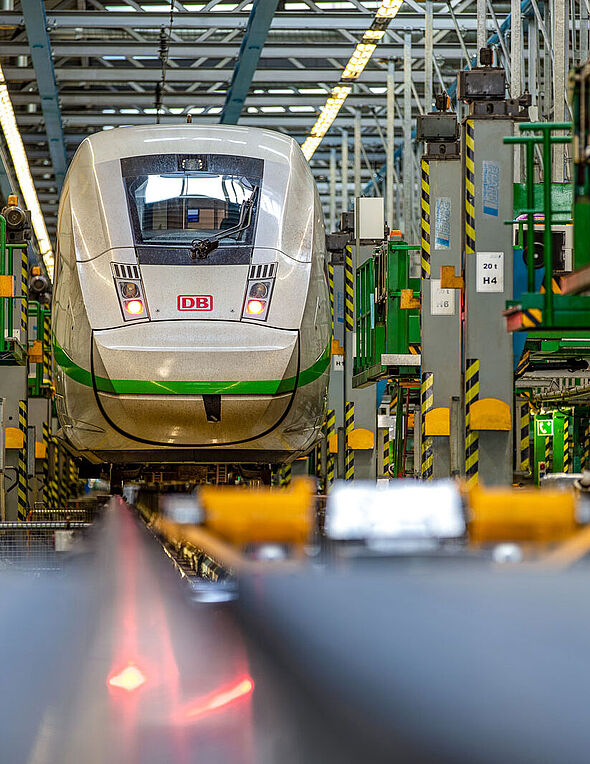DB Fernverkehr AG
New Maintenance Concept for DB Maintenance Facility in Munich
Maintenance Planning Based on Modular Principle
Reliable schedules are a fundamental requirement for efficient vehicle maintenance. However, maintenance activity is often planned according to imprecise and out-of-date time components. Moreover, the likelihood of available data producing cross-site synergy effects is still too low. This example of ICE 4 maintenance planning in Munich shows how organizations can improve in these areas. It saw DB Fernverkehr AG establish a comprehensive system in conjunction with Ingenics, and this system now serves as inspiration for further sites.

- Railway
- Creation of MTM analyses for the maintenance time period, incl. validation of all operating procedures with the works council
- Implementation of an efficient maintenance system
- 40 percent reduction of lead times (from five shifts with 50 hours time spent at the plant to two shifts with fewer than 18 hours)
- Reduction of the TMUs required for a maintenance time period from 650 hours to 400 hours
- Ongoing updates of maintenance versions
DB Fernverkehr AG staffs its maintenance facilities according to work schedules that are based on time standards for each maintenance activity. These calculation components needed to be defined at all relevant sites for the new generation of ICE 4 trains, including in Munich.
DB Fernverkehr AG uses methods-time measurement (MTM) analyses to analyze and efficiently plan recurring processes in the same way for different locations. Complex workflows are broken down into components, their times are assessed, and the workflows are progressively optimized. For step one, the MTM experts at Ingenics AG analyzed the individual time periods (e.g., brake inspections, summer/winter preparation) during which maintenance is performed on ICE 4 series trains in a given year. This time assessment focused on all steps and scopes of work that employees complete during a maintenance period, from reaching into the toolbox to distances traveled and repair work.
The individual activities were assessed in relation to their times, linked with each other, and added up as part of this initial analysis. Building on it, the Ingenics team worked together with the departments involved at DB Fernverkehr AG to arrange the components in a productive sequence. This part of the analysis focused on the technical and organizational interdependencies as well as on eliminating waste, the trackside availability of materials, and more beneficial utilization of human resources. Employees who were previously only responsible for their core duties, for example, were also posted to other positions if possible to keep idle time low.
The MTM analysis served as the foundation for a flow chart that visualizes all mandatory activities during a given maintenance period and defines them down to the employee level. As a result, DB Fernverkehr AG has already been able to reduce lead times significantly in practice. This flow chart was saved in the system and progressively adapted to reality in multiple iterative loops. Ingenics AG’s software development played a major role in this. “We developed the workload distribution diagram for projects where our clients wish to optimize complex, recurring processes involving many individual activities, for example transferring and updating new maintenance books. This IT tool helps to define optimized process flows based on clear assumptions and has been enhanced into an AI-assisted Web application with extended functionality over the course of the last year,” explains Sascha Drögmöller, Industry Manager, Ingenics AG.
The Ingenics AG team was able to achieve the agreed project objectives within the desired time frame using this solution-oriented approach. “The MTM analysis of the individual work steps and periods for maintaining an ICE is time-consuming and complex. Thanks to the support and software of Ingenics AG, we were able to achieve results sooner than planned. This was critical to the success of the project,” says Frank Markus, Vehicle and Process Engineering, DB Fernverkehr AG.
The newly defined calculation components enable a faster, more target-oriented evaluation of maintenance activities – and therefore more efficient and more robust staff scheduling. This involved collaborating closely with DB Fernverkehr AG to identify synergy effects across different vehicles and locations (e.g., similar maintenance scopes for the same assemblies and technologies) that allow better resource planning. The collaboration with the works council also proved to be seamless: “For us on the works council, it was important that we were involved in the project from the outset. The developments were ultimately going to influence the workflows performed by our site employees and were therefore covered by their codetermination rights. We are satisfied with the adjustments as they offer employees more certainty for planning, which is something we welcome,” says Florian Zenk, works council member at Maintenance Munich, DB Fernverkehr AG.
Owing to the positive results, the Munich system now serves as the model for optimizing further facilities, such as the ones in Hamburg, Berlin, and Cologne. The task at these locations remains the same as in Munich, optimizing maintenance using the modular MTM approach and by applying a workload distribution diagram. Employees working on planning and in operational areas work hand in hand to minimize the rolling stock’s downtimes in as fast and targeted a way as possible.
About DB Fernverkehr AG
DB Fernverkehr AG is a transportation provider based in Frankfurt am Main. The company was founded in 1999 and is a wholly owned subsidiary of Deutsche Bahn AG. It is responsible for long-distance transportation services domestically in Germany and internationally. Its long-distance fleet includes ICE, Intercity, and Eurocity trains. DB Fernverkehr AG’s fields of business furthermore include managing the DB Lounges that can be found at major German train stations.